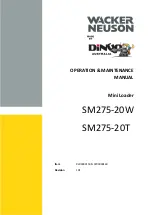
73
REGULAR CHECKS AND MAINTENANCE WORK
B
Battery Charging
To avoid personal injury:
A
When the battery is being activated, hydrogen
and oxygen gases in the battery are extremely
explosive. Keep open sparks and flames away
from the battery at all times, especially when
charging the battery.
A
When charging battery, remove battery vent
plugs.
A
When disconnecting the cable from the battery,
start with the negative terminal first.
When connecting the cable to the battery, start
with the positive terminal first.
A
Do not check battery charge by placing a metal
object across the terminals.
Use a voltmeter or hydrometer.
1. Make sure each electrolyte level is to the bottom of
vent wells, if necessary add distilled water in a well-
ventilated area.
2. The water in the electrolyte evaporates during
recharging. Liquid shortage damages the battery.
Excessive liquid spills over and damages the
excavator body.
3. To slow charge the battery, connect the battery
positive terminal to the charge positive terminal and
the negative to the negative, then recharge in the
standard fashion.
4. A boost charge is only for emergencies. It will partially
charge the battery at a high rate and in a short time.
When using a boost-charged battery, it is necessary to
recharge the battery as early as possible.
Failure to do this will shorten the battery's service life.
5. When the specific gravity of electrolyte falls between
1.27 and 1.29 charge has completed.
6. When exchanging an old battery for a new one, use a
battery of equal specification.
B
Greasing Swing Bearing Teeth
1. Pump grease with the grease gun through the grease
nipple.
2. Grease at each 90 (1.58 rad.) position of the swing
frame.
3. Fill with approx. 50g of grease (approx. 20 to 30
pumps with the grease gun at each position).
Distribute the grease over the teeth.
(1) Grease nipple (for swing bearing teeth)
Summary of Contents for KX057-4
Page 1: ......
Page 15: ...7 SAFE OPERATION 6 DANGER WARNING AND CAUTION LABELS...
Page 16: ...SAFE OPERATION 8...
Page 17: ...9 SAFE OPERATION...
Page 18: ...SAFE OPERATION 10...
Page 19: ...11 SAFE OPERATION...
Page 20: ...SAFE OPERATION 12...
Page 22: ......
Page 74: ...52 EXCAVATOR OPERATION...
Page 122: ...100 LIFTING CAPACITY...
Page 123: ...101 LIFTING CAPACITY...
Page 124: ...102 LIFTING CAPACITY...
Page 125: ...103 LIFTING CAPACITY...
Page 126: ...104 LIFTING CAPACITY...
Page 127: ...105 LIFTING CAPACITY...
Page 128: ...106 LIFTING CAPACITY...
Page 129: ...107 LIFTING CAPACITY...










































